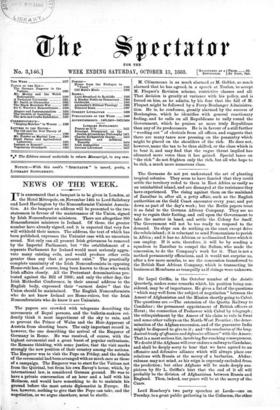The papers are crowded with telegrams describing the movements of
Royal persons, and the bulletin-makers evi- dently think it most impertinent of the sky to rain, and so prevent the Prince of Wales and the Heir-Apparent of Austria from shooting bears. The only important record is, however, the one describing the arrival of the Emperor of Germany in Rome. He was received, of coarse, with the highest ceremonial and a great burst of popular enthusiasm, the Romans thinking, with some justice, that the visit marks strongly the new position of their country among the nations. The Emperor was to visit the Pope on Friday, and the details of the ceremonial had been arranged with as much care as those of a campaign. The Emperor was to start for the -Vatican not from the Quirinal, but from his own Envoy's house, which, by international law, is considered German ground. He was to have a private conversation of an hour and a half with his Holiness, and would have something to do to maintain his ground before the most astute diplomatist in Europe. He has, however, nothing to give that the Pope can take, and the negotiation, as we argue elsewhere, must be sterile.


















































